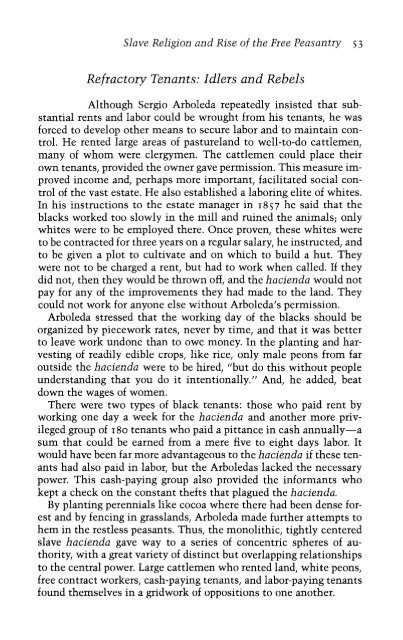The Devil and Commodity Fetishism in South America - autonomous ...
The Devil and Commodity Fetishism in South America - autonomous ...
The Devil and Commodity Fetishism in South America - autonomous ...
Create successful ePaper yourself
Turn your PDF publications into a flip-book with our unique Google optimized e-Paper software.
18 <strong>Devil</strong> <strong>and</strong> <strong>Commodity</strong> <strong>Fetishism</strong> <strong>in</strong> <strong>South</strong> <strong>America</strong><br />
<strong>The</strong> <strong>in</strong>terpretation that I wish to elaborate is that the devil-beliefs<br />
form a dynamic mediation of oppositions, which appear at a particularly<br />
crucial <strong>and</strong> sensitive po<strong>in</strong>t of time <strong>in</strong> historical development.<br />
<strong>The</strong>se beliefs can be thought of as mediat<strong>in</strong>g two radically dist<strong>in</strong>ct<br />
ways of apprehend<strong>in</strong>g or evaluat<strong>in</strong>g the world of persons <strong>and</strong> of<br />
th<strong>in</strong>gs. Follow<strong>in</strong>g Marx, I call these modes of evaluation use-value<br />
<strong>and</strong> exchange-value. Marx took this opposition from Aristotle <strong>and</strong><br />
wedded it to Hegelian logic to create the anvil on which he forged<br />
his critical portrait of capitalism <strong>and</strong> its transcendence by the evolv<strong>in</strong>g<br />
pattern<strong>in</strong>g of world history. In explor<strong>in</strong>g the dist<strong>in</strong>ct metaphysical<br />
<strong>and</strong> ontological connotations proper to each of these doma<strong>in</strong>s,<br />
use-value <strong>and</strong> exchange-value, we will <strong>in</strong>evitably be led to contrast<br />
precapitalist folk mysticism with that form of capitalist mystification<br />
Marx sardonically labelled commodity fetishism.<br />
Attitudes to Wage Labor <strong>and</strong><br />
Capitalist Development<br />
In the sugarcane plantations of the Cauca Valley <strong>and</strong> <strong>in</strong><br />
the t<strong>in</strong> m<strong>in</strong>es of highl<strong>and</strong> Bolivia it is clear that the devil is <strong>in</strong>tr<strong>in</strong>sic<br />
to the process of the proletarianization of the peasant <strong>and</strong> to the<br />
commoditization of the peasant's world. He signifies a response to<br />
the change <strong>in</strong> the fundamental mean<strong>in</strong>g of society as that mean<strong>in</strong>g<br />
registers <strong>in</strong> precapitalist consciousness. <strong>The</strong> neophyte proletarians<br />
<strong>and</strong> their surround<strong>in</strong>g peasant k<strong>in</strong>smen underst<strong>and</strong> the world of<br />
market relations as <strong>in</strong>timately associated with the spirit of evil. Despite<br />
all the possibilities of <strong>in</strong>creas<strong>in</strong>g their cash <strong>in</strong>comes, they still<br />
seem to view this new mode of production as productive of barrenness<br />
<strong>and</strong> death as well. To them, therefore, this new socioeconomic<br />
system is neither natural nor good. Instead, it is both unnatural<br />
<strong>and</strong> evil, as the symbolism of the devil so strik<strong>in</strong>gly illustrates. <strong>The</strong><br />
mean<strong>in</strong>g that is given to the devil <strong>in</strong> this situation is not unlike<br />
the def<strong>in</strong>ition that is given him by the Christian Fathers—"he who<br />
resists the cosmic process." As Joseph Needham notes, this comes<br />
close to the notion of forc<strong>in</strong>g th<strong>in</strong>gs <strong>in</strong> the <strong>in</strong>terest of private ga<strong>in</strong><br />
without regard to what are seen as their <strong>in</strong>tr<strong>in</strong>sic qualities (1956).<br />
This perception, with its passionate depth <strong>and</strong> sharpness, does not<br />
come out of the blue, so to speak, as the result of some mystical<br />
wisdom. Rather, it arises from a liv<strong>in</strong>g context of coexist<strong>in</strong>g ways of<br />
life: a peasant mode of production, <strong>in</strong> which the direct producers<br />
control means of production <strong>and</strong> organize work themselves, side by<br />
side with a capitalist mode of production, <strong>in</strong> which they control nei-
















